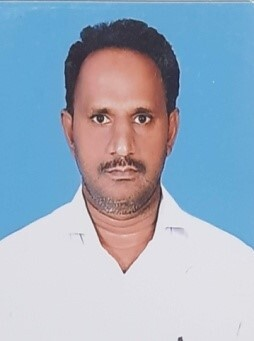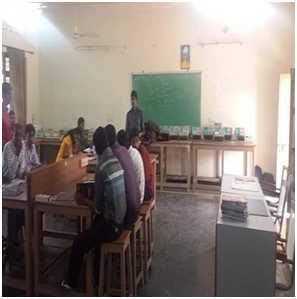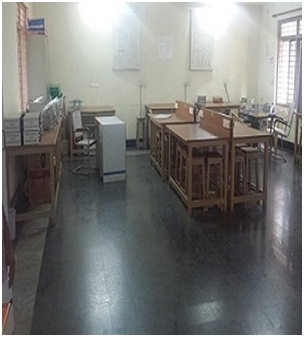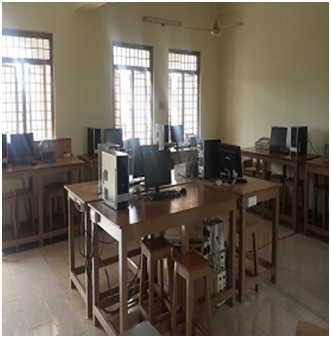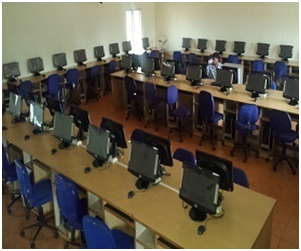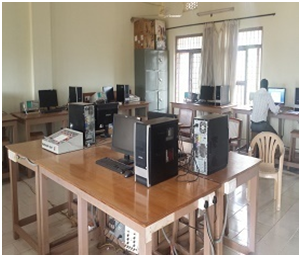About Department
The Department offers a B. Tech. program in Electronics
and Communication Engineering and a M.
Tech. degree in VLSI &ES Design. The faculty team
consists of experts from the industry and
academia. The department is highly praised for
its activities in the technical front, contributing
highly towards the development of cutting
edge technologies and professionals. While building a
solid foundation of the fundamentals, the
students are also exposed to emerging
trends in the industry and are molded to be quality
professionals of the future. Electronics and
Communication Engineering laboratories are equipped with
state-of-the-art equipment and advanced
software that enables the design
of Very Large Scale Integrated (VLSI) circuits. The
department offers hands on training to the
students to meet the requirements of industry through
well-equipped and updated technological
laboratories with state of the art equipment
under the guidance of highly qualified, experienced and
dedicated faculty.
Vision & Mission
Vision
To produce professionally competitive
engineering graduates in Electronics &
Communication Engineering with concern for society.
Mission
1.To impart quality education to the
students in the domain of Electronics &
Communication Engineering and related fields to make
them professionally competitive.
2. To import required skills to the students to make them
employable with minimum orientation.
3.Develop self-learning abilities and professional
ethics to enable them to serve the society.
PO's, PEO's, PSO's
Programme Outcomes
- PO1. Engineering Knowledge: Apply the
knowledge of mathematics, science, engineering
fundamentals, and an engineering
specialization to the solution of complex
engineering problems
- PO2. Problem analysis: Identify, formulate,
review research literature, and analyze
complex
engineering problems
reaching substantiated conclusions using first
principles of mathematics, natural sciences,
and engineering sciences.
.
- PO3. Design / development of solutions:
Design solutions for complex engineering
problems and
design system components or
processes that meet the specified needs with
appropriate consideration for the public health
and safety, and the
cultural, societal, and environmental
considerations.
- PO4. Conduct investigations of complex
problems: Use research-based knowledge and
research methods including design of
experiments, analysis and interpretation of data,
and synthesis of the information to
provide valid conclusions.
- PO5. Modern tool usage: Create, select, and
apply appropriate techniques, resources,
and modern engineering and IT tools
including prediction and modeling to complex
engineering activities with an understanding of
the limitations.
- PO6. The engineer and society: Apply
reasoning informed by the contextual knowledge
to assess health, safety, legal and
cultural issues and the consequent responsibilities
relevant to the engineering practice.
- PO7. Environment and sustainability:
Understand the impact of the professional
engineering solutions In societal and
environmental contexts, and demonstrate the
knowledge of and need for sustainable
development.
- PO8. Ethics: Apply ethical principles and
commit to professional ethics and
responsibilities and norms of the
engineering practice.
- PO9. Individual and team work: Function
effectively as an individual, and as a
member
or leader in diverse teams, and in
multidisciplinary settings.
- PO10. Communication: Communicate
effectivelyon complex engineering activities with
the
engineering community and with
society at large, such as, being able to comprehend
and write effective reports and design
documentation, make effective
presentations, and give and receive clear
instructions.
- PO11. Project management and finance:
Demonstrate knowledge and understanding of the
engineering and management
principles and apply these to one's own work, as a
member and leader in a team, to manage
projects' and in
multidisciplinary environments.
-
PO12. Life-long learning: Recognize the need
for, and have the preparation and
ability to engage in independent and
life-long learning in the broadest context of
technological change.
Programme Educational
Objectives
The objectives of Electronics and Communication
Engineering are to
- PEO1. To provide a solid foundation in Electronics
and Communications Engineering
to
impart them high quality technical skills.
- PEO2. To prepare and motivate students with recent
technological developments
related
to core subjects like programming, databases and
design of compilers.
-
PEO3. To train the students for a high degree of
employability in both public and
private
sector Industries by initiating in them professional
competence and ability to handle
critical
situations.
Programme Spicific Outcomes
The objectives of Electronics and Communication
Engineering are to
- PSO1. Professional Skills: The ability to
absorb and apply fundamental knowledge
of
core Electronics and Communication Engineering
subjects in the analysis, design and
development of various types of integrated
electronic systems.
- PSO2. Successful Career: Excellent
adaptability to changing work environment as a
leader in a team.
Welcome to
Prakasam
Engineering College
